New report identifies seven factors companies must address in order to realize sustainable practices.
The World Business Council for Sustainable Development (WBCSD) has issued a new report that shows how open, transparent markets can drive sustainability. It also makes the business case for implementing sustainable practices. Entitled Sustainability Through the Market: Seven Keys to Success, the document outlines seven keys to successful implementation and illustrates the economic benefits of doing so with real-world case studies.
The report, four years in the making, was co-authored by Chad Holliday, CEO and Chairman of Dupont (ticker:DD) and current Chairman of the WBCSD, and John E. Pepper, Chairman of Procter & Gamble (PG). The two introduced the report last week during a luncheon at the U.N. headquarters in New York City.
The market has a unique potential, when properly structured, to improve lives through new innovations, improved consumption and higher incomes, said Pepper. The WBCSD report shows how business can accelerate the markets effects and ensure responsible progress while doing so.
Sustainability Through the Market: Seven Keys to Success views sustainability as a holistic issue, with production and consumption not as separates but interrelated components. WBCSD says this perspective goes beyond most previous arguments, which tended to focus almost exclusively on lowering waste and lessening consumption.
Of the seven keys, the authors state that many companies already have practical experience with three of them. The first is innovation. The report states, Both technological and social innovation can do much to improve quality of life and address the depletion of resources and the build-up of pollution around the world. The authors say, however, innovation must be open and that companies must identify and publicize their values regarding their approach to innovation.
Eco-efficiency, the second key, is the better use of resources while reducing pollution. The third key is transforming stakeholder dialogues into action through partnerships. This can be seen in the increasing number of multi-stakeholder initiatives such as the U.N.s Global Compact and the Global Reporting Initiative, a worldwide effort to standardize sustainability disclosure.
The authors write that the remaining keys represent a more difficult challenge to stakeholders. The fourth key is consumer choice in a transparent and competitive market economy. The report optimistically states, Individuals will change their consumption practices when they realize that they can gain added value from sustainable behavior in terms of financial benefits, quality of life and security.
Improving market framework conditions is the fifth key. Where corruption, protectionism and monopolies exist, the authors note, sustainability is more difficult to achieve. The sixth key is incorporating environmental and social costs into the market. The authors say that this often can be achieved by full-cost pricing and removing perverse subsidies.
The report states that the seventh key is making the market work for everyone, including the poorest in the world. The way to reduce poverty is to promote continuous and broad-based market expansion that creates enterprises and jobs, the report asserts.
Each key includes case studies and examples that illustrate the benefits of pursuing sustainable practices. The subjects of those case studies include Sony (ticker: SNE), ABB (ABB), Dupont, and Procter & Gamble.
In the introduction to Sustainability Through the Market: Seven Keys to Success, calculations of international non-governmental organizations are cited. The research showed that when consumption rates in developed countries are applied to the rest of the world, three Earths are needed to provide the resources. Some of the views presented in the report may be open to debate by various stakeholders. However, one point that should receive little argument from all sides is, there is a lot of work to be done.



